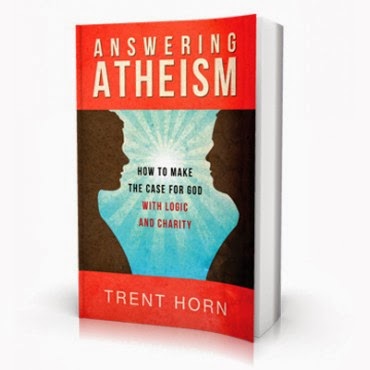Book Review – Answering Atheism
Trent Horn has been studying the phenomenon of atheism for
years. In his new book, Answering Atheism, published by Catholic
Answers Press, he makes a clear and charitable response.
The book is broken into three parts. The first clarifies the terms and positions
in the debate. He also analyzes its tone
in recent years, and promises that his work will not sink to the level of
insults and name-calling. In reading the
rest of the book, one finds that he keeps his word.
The second part of the book analyzes and critiques the
arguments for atheism. Often we find that
in talking to atheists, they will debate our positions for theism and see
atheism as a default position. It is as
if atheism is the starting point and as long as there is any conceivable answer
to our points (reasonable or not), then atheism must be assumed.
But of course this position is unreasonable. An atheist should be able to give clear
reasons for being an atheist. Horn looks
at the most common reasons in this section of the book, most notably the ideas
that the concept of God is a logical contradiction, and that the existence of
God is incompatible with the existence of suffering and evil. Horn very thoroughly and fairly presents the
atheist arguments, and very charitably and completely shows them to be false.
The third and longest part of the book includes the reasons
to believe in God (theism). Horn is not
specifically an apologist for Christianity in this work, although there are a
few points at which he shows that the Christian conception of God makes the
most sense out of reality.
Horn delves into the recent advances in physics that prove
the universe (space-time) had a beginning, before which there was nothing. And, of course, something can not come from
nothing. He looks at the improbable
fine-tuning of our universe that makes it capable of supporting life. Finally, he puts forth the moral arguments
for the existence of God and takes a look at personal experience.
In the spirit of Thomas Aquinas, Horn gives voice to every
possible objection to his arguments.
Much of the book, in fact, is spent answering these challenges. The result is that when the reader is
finished, it is very likely he will have any points of disagreement left
untreated.
My criticisms of this book are few. The first was touched on earlier this week in
my
article about evolutionism. The only
other thing to watch out for is that because Horn goes through so many
difficulties people might have with his arguments, at times the main point can
get lost in the technicalities.
This technique, I’m sure, is very helpful to the skeptical
reader and he does well by leaving some of the more far-fetched objections to
the appendices, allowing the main text to flow more smoothly.
Overall, Answering
Atheism is a worthy book to add to one’s library. It is intellectual but not difficult to
read. It can also serve as a powerful
reference tool when challenged by an atheistic argument whose answer is not
readily on the tip of the tongue.




